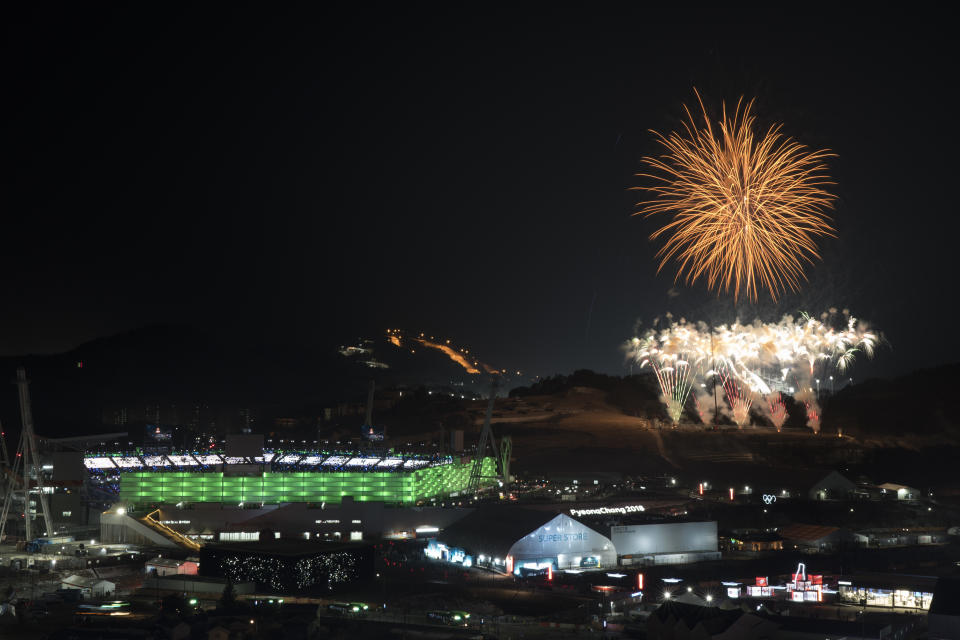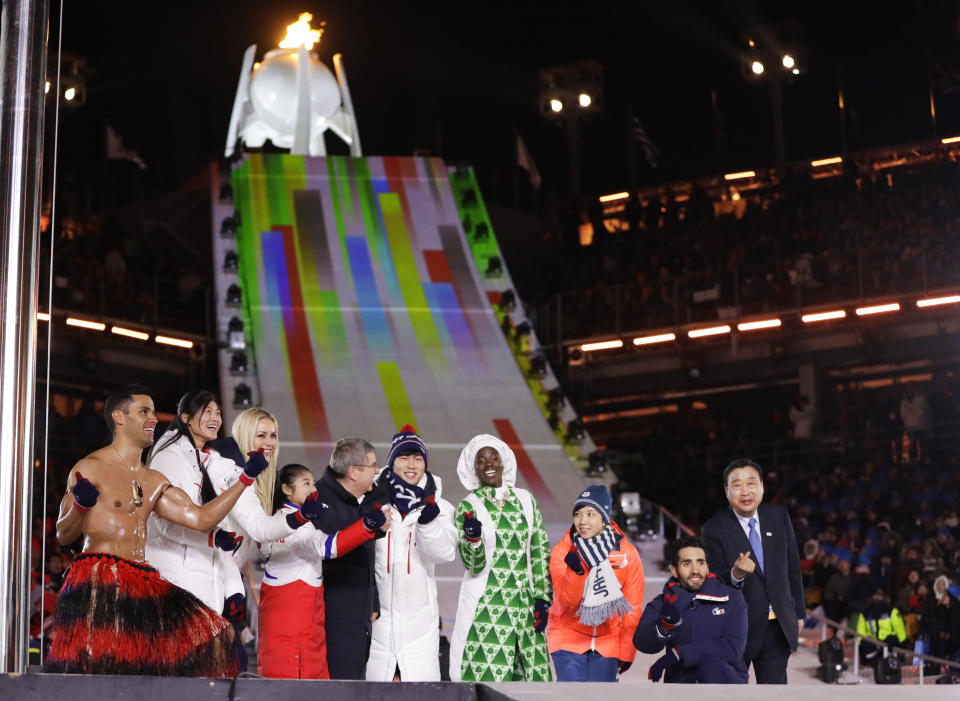PyeongChang bids farewell to the world with raucous Closing Ceremony
PYEONGCHANG, South Korea—One of the best parts of every Closing Ceremony is the way that Olympians march in en masse, a group of competitors no longer separated by national origin. It’s an easy visual metaphor, yes, but it’s a good one too, an opportunity to see the Olympics as their own self-imagined ideal: competition that leads to a deeper connection.
The PyeongChang Olympics closed on Sunday night with a ceremony that was a bit of a Vegas buffet, something for everyone, but the emotional highlight was, without a doubt, that athlete march. Nearly 3,000 of them walked onto the circular floor of PyeongChang Stadium, some waving flags, some with their arms around each other, some riding on others’ shoulders, and some sporting the medals they’d won these last two weeks. They posed for selfies as frustrated production assistants just offstage tried to hustle them into their seats, but this was the athletes’ last moment on the world stage—they weren’t surrendering it for anyone. In the highly regimented, time-is-of-the-essence world that is the Olympics, it was a rare moment of imprecise, glorious humanity.
There was a bit of the half-full school play about all of these Games; attendance was sparse at virtually all events that didn’t feature South Koreans in marquee roles. While there were bright, peppy Olympic signs running all the way from Gangneung on the coast to Phoenix Park in the mountains, a distance of 60 miles—almost all seemed temporary, almost all seemed like they’d be a painful, cringeworthy reminder of what had been if you happened to run across them two or five or ten years down the road. Behind those signs, the mountains were brown and the trees sparse, and you have to wonder how much will have changed for the better a decade from now because of these Games.
The Olympic volunteers were uniformly cheerful—beyond cheerful, they were exuberant, every last smiling one of them—everywhere from the always-on-time shuttle buses to the innumerable security stops to the late-night bowling alley a few of your humble correspondents frequented to a Gangneung roast chicken joint we visited with religious devotion. But will that exuberance, and the goodwill it inspired, be enough to transform PyeongChang into the tourist destination it hopes to become after these games? The Gangwon Province government is gambling the region’s future on it.

For America, these Olympics represented a chance to reassess, a time to consider where we’ve fallen short—athletically speaking—and where our future looks bright. Snowboarding, of all sports, appears to be the leading edge for America going forward, with bright lights like Chloe Kim and Red Gerard—neither of whom were even born in the 1990s—leading the way for the United States into 2022 and beyond.
There were more, so many more:
• Jessie Diggins and Kikkan Randall might just have given us the victory of the Games, taking the cross-country relay event by a mere 0.19 seconds.
• The tale of “Team Reject”—the four curlers who didn’t quit their day jobs but won a gold medal anyway—was one of the best of the Games.
• The women’s hockey team had been pounding at the door of triumph for years, and finally kicked it wide open with one beautiful overtime flick off the stick of Jocelyne Lamoreux-Davidson.
• Mikaela Shiffrin cemented her place as one of the best athletes in America right now—don’t buy into that five-gold-medals nonsense from before the Games; Shiffrin’s gold and silver are a sterling achievement—and Lindsey Vonn skied what’s likely to be her last Olympics with grace…and not a little regret.
• Shaun White further embellished his status as one of America’s premier Olympians, though his difficult history—and a stumbling attempt to brush it off right after his gold-medal victory—took a bit of shine off his win.
On the other hand, much of America’s future on ice appears treacherous, at best. The 2018 Games marked the United States’ worst performance in ice skating events in decades. The personality of Adam Rippon didn’t translate to hardware, and the post-skate tantrum of Mirai Nagasu will linger long after the memory of her apology. The Shibutani siblings made for some serious must-watch television, but beyond their bronze, there wasn’t much to crow about for the ice-skating contingent.
The men’s hockey team battled valiantly, but you can’t throw college kids against the Red Machine and expect anything other than carnage. As long as the NHL decides to keep its pucks at home—and there’s every chance they’ll be more amenable to a 2022 date in the highly desirable market of China—the U.S. is playing the equivalent of a shorthanded three-on-five power play.
All the misfires and shortcomings—there were so, so many fourth- and fifth-place finishes—are forcing the USOC to take a harder look at how to improve America’s standing in the cold-weather sports. All told, America totaled only 23 medals—its lowest figure in 20 years, below even the USOC’s minimum baseline projection. The USOC generally allocates the most money to the sports that have the best medal projections, but what to do when the marquee sports like skiing and ice skating have poor medal prospects? It’s a dilemma that will challenge the United States’ flexibility and creativity.
Beyond our own parochial concerns, though, there’s hope—however slight, however naïve—that these Olympics might spur some long-term change. First and foremost, of course, is the prospect that the two Koreas—nations divided by barbed wire, nations divided by a bloody history—might once again find some common ground. North Korean athletes joined in many competitions, and North Korean cheerleaders dutifully rooted them on. While no one should mistake these efforts as evidence of a changed North Korea, the fact that there are Koreans even passing back and forth over the border at all is a small reason for optimism.
Plus, the IOC managed to rescue a weak, watery victory from the jaws of self-inflicted defeat by forbidding Russia from flying its flag in the Closing Ceremony—this, despite the fact that Russia, which had been suspended as a nation for widespread and concerted doping, had two of its athletes popped for using illegal substances in these Games. The fact that it took the IOC longer than it takes to say NO to even “debate” the issue of Russia’s flag is absurd, but—dithering or not—the IOC arrived at the right answer just hours before the Closing Ceremony began.
On a broader scale, there was, if you looked in the right direction, more indication that the true forces of these Games—no, not the sponsors, the athletes—might finally start claiming their share of this vast, rich pie. Vic Wild, who literally changed nations from the United States to Russia because of frustration over the USOC’s deep-seated corruption, aired the revolutionary idea that Olympic athletes ought to unionize—and might just kickstart a revolution of his own.
Larger questions linger, of course. They always do. Beyond the geopolitical concerns of North and South Korea, beyond the question of just what to do about Russia, which seems determined to subvert every aspect of the Games, from doping to cybersecurity, and dare anyone to call it out, there’s the question of what happens to PyeongChang.
You spend three straight weeks in a place, and you start to fall a little bit in love with it. And so I worry about this place, I worry that this remote, rural section of a thriving nation will crumble under the financial stress of these Games. As I write these words, I’m sitting in a $109 million stadium that’s been used exactly two times—for the Opening and Closing ceremonies—and will be used just two more, for the Paralympics—before being demolished. It’s a sleek, fascinating, pentagonal structure—and just maintaining it would be too much for this tiny community to handle.
PyeongChang is a fishing community—there are racks of thousands of drying fish literally right across the street from the stadium—and how it will handle half a dozen hulking arenas remains a mystery. (The local government already shot down an idea to use the speed skating rink as a storage facility for frozen fish; as beneficial as that might be for the local economy, turning a scene of South Korean triumph into a fish locker didn’t sit too well symbolically with the local authorities.)
There are promises of future tournaments at the sites of the hockey and short-track speed-skating, and curling’s “Garlic Girls” have helped slide that sport into South Korea’s mainstream. But what about, say, the bobsled track? What about the ski jump? South Korea is off the ramp and in the air right now, with no idea what’s waiting for it at the bottom.
For a night, though, the nation got to revel in some well-deserved glory. A 13-year-old South Korean guitarist, Yang Tae-hwan, kicked off the night by absolutely shredding to front an entire orchestra. Light shows, dancing, fireworks—aside from the requisite IOC speeches that stopped the night cold(er), it was a fine party. And an appearance by the Winter Olympics Avengers—including Vonn and, yes, that doggone Tongan flagbearer—added just the right amount of cheese to the ceremonies. The night closed with a 15-minute DJ-hosted EDM mini-rave, athletes and volunteers and dancers and mascots all gathering around a giant snow globe for one last celebration of a remarkable couple of weeks.
So farewell and gomabseubnida, PyeongChang. You were an outstanding host. Here’s hoping the years to come look on you as warmly as we do now.

____
Jay Busbee is a writer for Yahoo Sports. Contact him at jay.busbee@yahoo.com or find him on Twitter or on Facebook.

